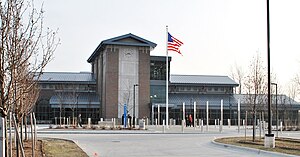
Dearborn is a city in Wayne County, Michigan, United States. It is an inner-ring suburb in Metro Detroit, bordering Detroit to the south and west, and roughly 7 miles (11.3 km) west of downtown Detroit. In the 2020 census, it had a population of 109,976, ranking as the seventh-most populous city in Michigan. Dearborn is best known as the hometown of the Ford Motor Company and of its founder, Henry Ford.

Michigan Central Station is the historic former main intercity passenger rail station in Detroit, Michigan. Built for the Michigan Central Railroad, it replaced the original depot in downtown Detroit, which was shuttered after a major fire on December 26, 1913, forcing the still unfinished station into early service. Formally dedicated on January 4, 1914, the station remained open for business until the cessation of Amtrak service on January 6, 1988. The station building consists of a train depot and an office tower with thirteen stories, two mezzanine levels, and a roof height of 230 feet. The Beaux-Arts style architecture was designed by architects who had previously worked together on Grand Central Terminal in New York, and it was the tallest rail station in the world at the time of its construction.
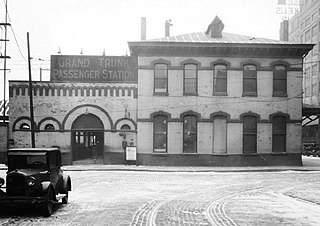
Brush Street Station was a passenger train station on the eastside of downtown Detroit, Michigan, located at the foot of Brush Street at its intersection with Atwater Street and bordered by the Detroit River to the south.

The Suburban Mobility Authority for Regional Transportation (SMART) is the public transit operator serving the suburbs of Detroit, Michigan, United States. Beginning operations in 1967 as the Southeastern Michigan Transportation Authority (SEMTA), the agency was reorganized and renamed SMART in 1989. SMART operates 44 bus routes, plus paratransit and microtransit services.
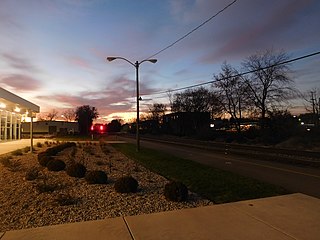
Capital Area Multimodal Gateway, also known as East Lansing station, is an intermodal transit station in East Lansing, Michigan. Operated by the Capital Area Transportation Authority (CATA), it is served by Amtrak's Blue Water passenger train, local buses, and intercity buses. It opened in 2015 to replace a nearby Amtrak and bus station operating since 1974.

The Kalamazoo Transportation Center is an intermodal complex in downtown Kalamazoo, Michigan. Amtrak and Greyhound provide regular service there. The center is also the major downtown transfer hub for Kalamazoo's Metro Transit bus system.

The Wolverine is a higher-speed passenger train service operated by Amtrak as part of its Michigan Services. The 304-mile (489 km) line provides three daily round-trips between Chicago and Pontiac, Michigan, via Ann Arbor and Detroit. It carries a heritage train name descended from the New York Central.

Battle Creek Transportation Center is an intermodal station in Battle Creek, Michigan, used by Amtrak, Indian Trails and Greyhound Lines. It is at the split between the routes of Amtrak's Blue Water and Wolverine passenger trains. The International Limited, which had started in 1982 as joint operation by Via Rail and Amtrak between Chicago and Toronto, was discontinued in 2004.

Birmingham was an Amtrak train station in Birmingham, Michigan, served by the Wolverine service. The station was located on an embankment at the eastern end of Villa Road, and consisted of a concrete platform with a small shelter and wheelchair lift. On October 13, 2014, the station was closed and replaced by the Troy Transit Center, located about 1,200 feet (370 m) southeast on Doyle Drive in Troy, Michigan.

The Royal Oak Transit Center is an intermodal transit station in Royal Oak, Michigan, a suburb of Detroit. It is served by Amtrak's Wolverine, which makes three round trips daily from nearby Pontiac to Chicago, Illinois. It also serves as a major hub for the region's SMART public transit network, serving four crosstown routes, and housing the system's only staffed ticket office in the suburbs. The station's Amtrak platform is unstaffed, though there is an Amtrak ticketing kiosk within SMART's facility.

Detroit station is an intermodal transit station in Detroit, Michigan. Located in New Center, the facility currently serves Amtrak and QLine streetcars. It also serves as a stop for Greyhound Lines, Detroit Department of Transportation buses, SMART and buses. Baltimore Street station, in the median of Woodward Avenue, serves streetcars to Midtown and Downtown. It is located at the southwest corner of Woodward and West Baltimore Avenues. Amtrak's Wolverine line serves an elevated platform at the main building.

The Vernon J. Ehlers Station is a train station in Grand Rapids, Michigan, United States served by Amtrak, the U.S. national railroad passenger system. The station is the terminus of the Pere Marquette line that connects Chicago's Union Station to Grand Rapids. It opened at its new location on Century Avenue under the Wealthy Street/US Highway 131 overpass, immediately south of The Rapid's Central Station. It is named in honor of then-Congressman Vernon J. Ehlers.
The North Charleston Intermodal Transportation Center is an intermodal transit station in North Charleston, South Carolina, United States. It serves as the Amtrak train station for the Greater Charleston area as well as a bus terminus for the Charleston Area Regional Transportation Authority (CARTA) and Southeastern Stages, a regional intercity bus common carrier. The street address is 4565 Gaynor Avenue, and is located in the Liberty Hill neighborhood.

Ann Arbor–Detroit Regional Rail is a proposed commuter rail service along the Michigan Line between the cities of Ann Arbor and Detroit, Michigan, a total length of 39.72 miles (63.92 km). The project would connect with a proposed Detroit bus rapid transit service and the QLine streetcar.

The Anaheim Regional Transportation Intermodal Center (ARTIC) is an intermodal transit center in Anaheim, California, United States. It serves as a train station for Amtrak intercity rail and Metrolink commuter rail, as well as a bus station used by the Orange County Transportation Authority (OCTA), Anaheim Resort Transportation (ART), Greyhound, Megabus, Flixbus and Tres Estrellas de Oro.
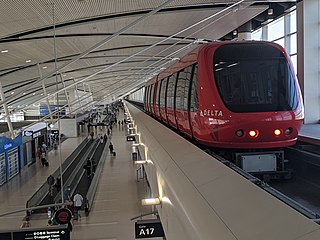
Transportation in metropolitan Detroit comprises an expansive system of roadways, multiple public transit systems, a major international airport, freight railroads, and ports. Located on the Detroit River along the Great Lakes Waterway, Detroit is a significant city in international trade, with two land crossings to Canada. Three primary Interstate highways serve the region.

Greenfield Village was an Amtrak station in Dearborn, Michigan served by the Wolverine. It closed to regular seasonal service in 2006 and to all service in 2014. The station had a single side platform serving one of the two tracks of the Michigan Line. A pedestrian crossing from the platform led to The Henry Ford at Smiths Creek Depot on the parallel Weiser Railroad.

The Pontiac Transportation Center is an intermodal terminal station located in Pontiac, Michigan that is served by Amtrak's Michigan Services Wolverine. The transportation center is also served by Indian Trails intercity bus service and Suburban Mobility Authority for Regional Transportation (SMART) regional bus service.

SEMTA Commuter Rail, also known as the Silver Streak, was a commuter train operated by the Southeastern Michigan Transportation Authority (SEMTA) and the Grand Trunk Western Railroad between Detroit and Pontiac, Michigan. It began in 1974 when SEMTA assumed control of the Grand Trunk's existing commuter trains over the route. SEMTA discontinued operations in 1983. Amtrak began offering intercity service between Detroit and Pontiac in 1994 as part of its Michigan Services.
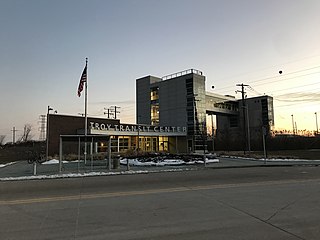
The Troy Transit Center is an unstaffed train station in Troy, Michigan, United States, that is served by Amtrak's Wolverine, which runs thrice daily between Chicago, Illinois, and Pontiac, Michigan. It is also served by Suburban Mobility Authority for Regional Transportation (SMART). The transit center replaced the nearby Birmingham Amtrak station in October 2014.
